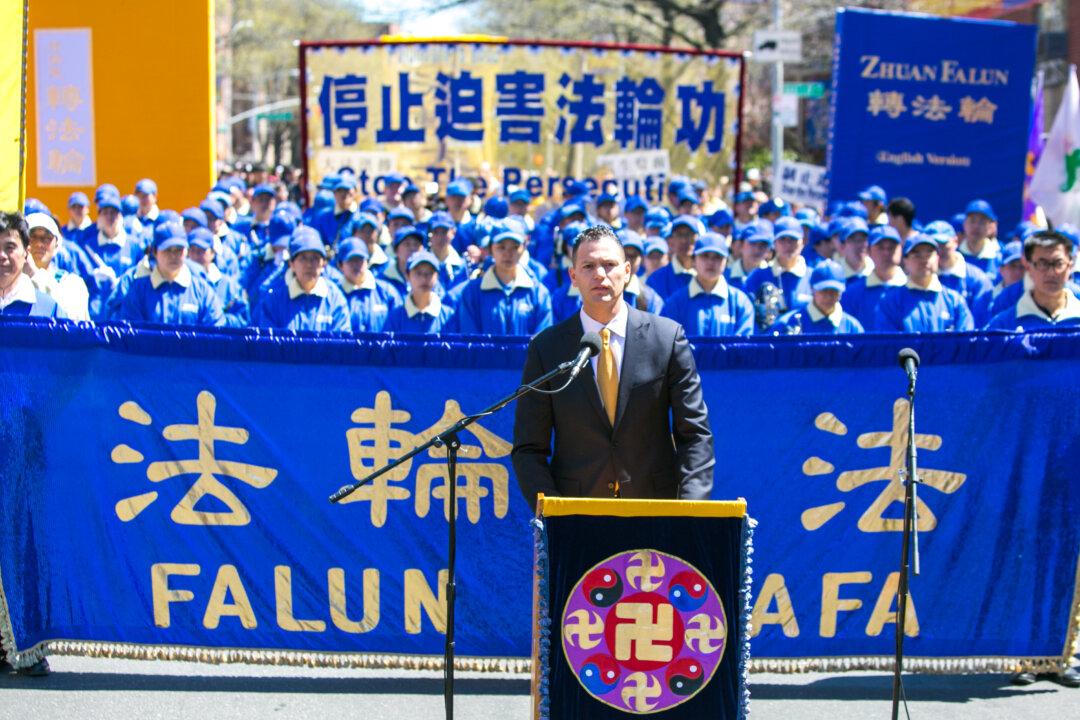On April 25, practitioners of Falun Gong around the globe held commemorative events to remember a historic incident that unfolded sixteen years ago.
Two days before that fateful day in 1999, about forty Falun Gong practitioners in the Eastern Chinese city of Tianjin were beaten and arrested by local security forces. This shocked practitioners of the traditional Chinese meditation—this was the first time that the Chinese regime had used such heavy-handed tactics to deal with Falun Gong since it was introduced to the public in 1992.
Practitioners appealed to the Tianjin police for the release of their fellows, but the police told them to look for the Party higher-ups in Beijing instead. So Falun Gong practitioners across mainland China—about 10,000 in total—journeyed to the Central Appeals Office to make their case on April 25, 1999.
Police, perhaps with prior planning, directed them to the streets around Zhongnanhai, the headquarters of the Chinese Communist Party.
Eventually, Zhu Rongji, the former Chinese premier, spoke with some practitioner representatives, and promised that those detained in Tianjin would be released and that the Party didn’t oppose Falun Gong. The Falun Gong practitioners then quietly left, clearing the pavements they occupied of litter and policemen’s cigarettes butts on the way home.
But the promise was short lived—former Chinese leader Jiang Zemin ordered a crackdown on July 20 that year—but the moment where Chinese people peacefully and successfully bargained with the most brutal regime in history is still remembered today.
From North America, Australia, Europe to Asia, the April 25 commemorations took the form of rallies, parades, candlelight vigils, and demonstrations in front of local Chinese Consulate buildings. Together, they express one voice: “End the persecution.”
San Francisco, USA
Ms. Wang, a native of Liaoning Province, recounted her experience outside the Chinese Consulate: “On April 20, 1999, we were told that many Tianjin Falun Gong practitioners were illegally arrested and even seriously wounded by the police beating. We all know that Falun Dafa teaches people to cultivate one’s heart and be kind, and that can only benefit the people and the country. With our thoughts of goodness and trust in the government, we went to Beijing to appeal and to clarify the real situation about Falun Dafa in hope that the arrested practitioners could be released.”
Everyone was peaceful, rational, and stood quietly on the sidewalk, Ms. Wang recalls. “The Falun Gong practitioners have conducted an unprecedentedly peaceful and rational petition.”
New Zealand
In front of Chinese Consulate in Auckland on April 25, Wang Jiuchun, a former associate professor at Tsinghua University, said: “I can not ignore my fellow practitioners being arrested. Truthfulness, compassion, and tolerance guides them, and I have gained so much from the practice. When Falun Gong is framed, of course I must go clear up the matter.”
Hong Kong
During the April 25 rally in Hong Kong, local legislator Leung Kwok-hung said: “The Chinese Communist Party’s persecution of Falun Gong is a persecution against all. The persecutors ultimately be prosecuted, just like the former Politics and Law Committee head Zhou Yongkang.”
France
Benjamin Ismail, Head Asia-Pacific desk Reporters Without Borders (RSF), a France-based non-profit media watchdog, spoke at the commemoration event. Ismail believes that people can help to end the persecution of Falun Gong sharing the truth of the matter. In China, it is crucial that people are able to break down the Great Firewall of China and gain access to uncensored information about Falun Gong and the persecution, which is an issue that everyone should be concerned about.
Australia
On the evening of April 24, a candlelight vigil was held in downtown Brisbane. One passersby, Reese Martin, signed a petition after learning what the April 25 event was about and the on-going live organ harvesting in China.
Martin, whose mother had taught in Hebei Province college for a year, was forced to give up Christianity. “She is an Australian, she can go back to Australia. But they can’t. They have to live their lives in such a persecution. That’s not right.”




